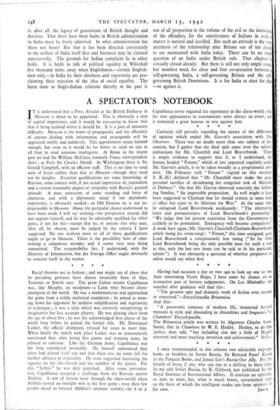Racial theories are in fashion ; and one might say
of chess that its presiding geniuses have almost invariably been of Slav, Teutonic or Jewish race. The great Cuban master Capablanca was, like Morphy, an exception—a Latin who became chess- champion of the world. He was a mathematician and approached the game from a coldly analytical standpoint ; he aimed at wear- ing down his opponent by ruthless simplification and superiority of technique ; it was a style which was intensely exasperating to imaginative but less accurate players. He was playing chess from the age of about five ; he was the acknowledged first player of the world long before he gained the formal title. Dr. Emmanuel Lasker, the official champion, refused for years to meet him. When finally the match took place Lasker was so remorselessly outclassed that, after losing five games and winning none, he refused to continue. Like the German Army, Capablanca was for long considered invincible. He himself announced that chess had played itself out and that there was no room left for further advance or originality. He even suggested increasing the squares on the chessboard and the number of the pieces. For this " hybris " he was duly punished. After some prevarica- tion, Capablanca accepted a challenge from the Russian master Alekhin. A sort of frisson went through the chess-world when Alckhin scored an outright win in the first game ; even then few people dared to forecast Alekhin's ultimate victory,—by 6 to 3.
Capablanca never regained his supremacy in the chess-world ; but his rare appearances in tournaments were always an event, and it remained a great honour to win against him.


























 Previous page
Previous page